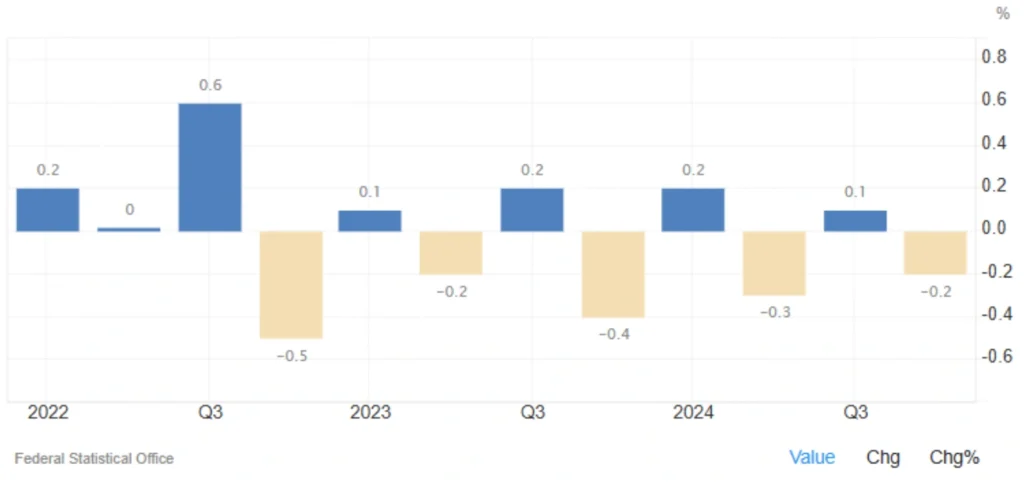
Germany’s Economic Recession in Q4 2024: Why It Matters
Germany’s economy faced a setback in the fourth quarter of 2024, shrinking by 0.2% compared to the previous quarter. Germany’s Economic Recession matched initial estimates and followed modest growth of 0.1% in Q3. But what exactly caused this downturn, and why should we care? Let’s break down the details and explore the broader implications.
What Led to Germany’s Economic Decline?
One of the main drivers of this economic slowdown was the negative impact of net trade. Exports fell by 2.2%, a sharper drop compared to the 1.9% decline in Q3. Meanwhile, imports rose by 0.5%, slightly lower than the 0.6% increase in the previous quarter. This imbalance points to weakening global demand for German products, compounded by challenges from U.S. trade policies and tariffs.
Sluggish Consumer Spending
German households tightened their belts in Q4, with consumption growth slowing to just 0.1%, down from 0.2% in Q3. This dip reflects declining consumer confidence as inflation and rising energy costs put pressure on household budgets.
Government Spending and Fixed Investment
While government spending increased by 0.4%, this was a notable slowdown from the 1.5% rise in Q3. On a more positive note, fixed investment rebounded by 0.4%, driven mainly by growth in the construction sector. However, this wasn’t enough to offset declines in other areas.
Read More: Germany’s Services Sector Returns to Growth
How Did Different Sectors Perform?
Most industries in Germany experienced contractions during Q4. Agriculture, forestry, and fishing saw a 1% decline, while manufacturing dropped by 0.6%. Despite this, the construction sector showed some resilience, contributing to the improvement in fixed investment.
Annual Performance and Long-Term Trends
Looking at the bigger picture, Germany’s economy shrank by 0.2% year-on-year, marking the sixth consecutive quarter of decline. This prolonged recession signals deeper structural challenges for Europe’s largest economy.
Why Is This Important for the Global Economy?
As the largest economy in the Eurozone, Germany’s performance significantly influences the region’s overall growth. A recession in Germany could drag down Eurozone growth and spark broader economic concerns. Additionally, reduced German demand for imports could negatively impact other European countries that rely on exporting to Germany.
Impact on Financial Markets and the Euro
- Weaker Euro (EUR): Economic struggles in Germany could lead to a decline in the euro’s value as investors grow pessimistic about the Eurozone’s growth prospects.
- Stock Market Pressure: German stocks, particularly in manufacturing and export-driven sectors, may face downward pressure due to reduced earnings and growth expectations.
- ECB Policy Decisions: The European Central Bank (ECB) might respond to the economic slowdown by maintaining expansionary monetary policies or even cutting interest rates to stimulate growth.
Geopolitical and Political Implications
Germany’s downturn could slow growth across the Eurozone and heighten fears of a broader regional recession. Additionally, a decline in German exports could reduce global trade volumes, impacting economies reliant on exports.
Influence of U.S. Trade Policies
U.S. tariffs and potential new trade restrictions on German goods, especially in the automotive and machinery sectors, have compounded Germany’s economic challenges. These geopolitical tensions are likely to continue influencing trade dynamics and economic performance.

Understanding Economic Recession: A Quick Guide
An economic recession is defined as a continuous decline in Gross Domestic Product (GDP) over two or more consecutive quarters. It typically leads to reduced consumer demand, decreased investment, increased unemployment, and lower industrial output.
Types of Economic Recession
- Technical Recession: Occurs when GDP declines for two consecutive quarters.
- Structural Recession: Results from deeper economic issues, such as declining productivity or demographic changes.
- Global Recession: Triggered by a worldwide demand slowdown or international economic shocks.
How Recessions Impact Economies and Markets
- Reduced Consumer Spending: Households spend less due to declining incomes and economic uncertainty.
- Rising Unemployment: Companies cut back on production, leading to job losses.
- Financial Market Volatility: Stock prices and currency values typically decline during recessions.
- Policy Responses: Central banks may lower interest rates, and governments might introduce fiscal stimulus to counter the downturn.
Looking Ahead: What’s Next for Germany’s Economy?
The 0.2% contraction in Q4 2024 underscores the structural challenges and declining global demand facing Germany’s economy. Analysts expect the European Central Bank (ECB) to maintain its expansionary monetary policies to support growth, but inflation and economic uncertainty will remain significant challenges.
The outlook for the euro (EUR) and German stock market remains cautious, with downward pressure expected in the near term. Additionally, U.S. trade policies and Germany’s upcoming federal elections will be key factors influencing the country’s economic direction.
Final Thoughts: Why It Matters to You
Germany’s economic health doesn’t just impact Europe; it has global implications. From currency fluctuations to changes in trade dynamics, the ripple effects of Germany’s recession will be felt worldwide. Whether you’re an investor, business owner, or simply curious about global economics, staying informed about these trends is essential.
Share
Hot topics

Best broker for gold trading
There’s always been a certain magic about gold. Before online charts and trading applications, people stored their wealth in coins and bars, trusting that gold would retain its value during...
Read more




Submit comment
Your email address will not be published. Required fields are marked *